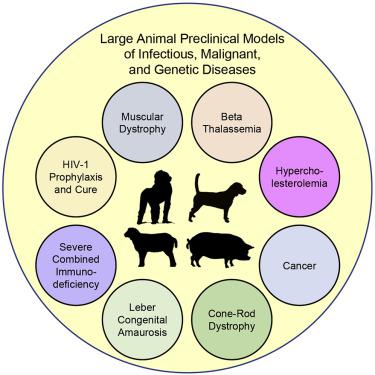当前位置:
X-MOL 学术
›
Mol. Ther.
›
论文详情
Our official English website, www.x-mol.net, welcomes your
feedback! (Note: you will need to create a separate account there.)
Genome editing in large animal models
Molecular Therapy ( IF 12.1 ) Pub Date : 2021-10-01 , DOI: 10.1016/j.ymthe.2021.09.026 Lucy H Maynard 1 , Olivier Humbert 2 , Christopher W Peterson 2 , Hans-Peter Kiem 2
Molecular Therapy ( IF 12.1 ) Pub Date : 2021-10-01 , DOI: 10.1016/j.ymthe.2021.09.026 Lucy H Maynard 1 , Olivier Humbert 2 , Christopher W Peterson 2 , Hans-Peter Kiem 2
Affiliation

|
Although genome editing technologies have the potential to revolutionize the way we treat human diseases, barriers to successful clinical implementation remain. Increasingly, preclinical large animal models are being used to overcome these barriers. In particular, the immunogenicity and long-term safety of novel gene editing therapeutics must be evaluated rigorously. However, short-lived small animal models, such as mice and rats, cannot address secondary pathologies that may arise years after a gene editing treatment. Likewise, immunodeficient mouse models by definition lack the ability to quantify the host immune response to a novel transgene or gene-edited locus. Large animal models, including dogs, pigs, and non-human primates (NHPs), bear greater resemblance to human anatomy, immunology, and lifespan and can be studied over longer timescales with clinical dosing regimens that are more relevant to humans. These models allow for larger scale and repeated blood and tissue sampling, enabling greater depth of study and focus on rare cellular subsets. Here, we review current progress in the development and evaluation of novel genome editing therapies in large animal models, focusing on applications in human immunodeficiency virus 1 (HIV-1) infection, cancer, and genetic diseases including hemoglobinopathies, Duchenne muscular dystrophy (DMD), hypercholesterolemia, and inherited retinal diseases.
中文翻译:

大型动物模型中的基因组编辑
尽管基因组编辑技术有可能彻底改变我们治疗人类疾病的方式,但成功临床实施的障碍仍然存在。越来越多的临床前大型动物模型被用来克服这些障碍。特别是,必须严格评估新型基因编辑疗法的免疫原性和长期安全性。然而,寿命较短的小动物模型,例如小鼠和大鼠,无法解决基因编辑治疗后数年可能出现的继发性病变。同样,免疫缺陷小鼠模型根据定义缺乏量化宿主对新转基因或基因编辑基因座的免疫反应的能力。大型动物模型,包括狗、猪和非人类灵长类动物 (NHP),与人类解剖学、免疫学和寿命更加相似,可以使用与人类更相关的临床给药方案进行更长的时间尺度研究。这些模型允许进行更大规模的重复血液和组织采样,从而能够进行更深入的研究并专注于罕见的细胞亚群。在此,我们回顾了大型动物模型中新型基因组编辑疗法的开发和评估的最新进展,重点关注在人类免疫缺陷病毒 1 (HIV-1) 感染、癌症和遗传性疾病(包括血红蛋白病、杜氏肌营养不良症 (DMD))方面的应用、高胆固醇血症和遗传性视网膜疾病。
更新日期:2021-10-01
中文翻译:

大型动物模型中的基因组编辑
尽管基因组编辑技术有可能彻底改变我们治疗人类疾病的方式,但成功临床实施的障碍仍然存在。越来越多的临床前大型动物模型被用来克服这些障碍。特别是,必须严格评估新型基因编辑疗法的免疫原性和长期安全性。然而,寿命较短的小动物模型,例如小鼠和大鼠,无法解决基因编辑治疗后数年可能出现的继发性病变。同样,免疫缺陷小鼠模型根据定义缺乏量化宿主对新转基因或基因编辑基因座的免疫反应的能力。大型动物模型,包括狗、猪和非人类灵长类动物 (NHP),与人类解剖学、免疫学和寿命更加相似,可以使用与人类更相关的临床给药方案进行更长的时间尺度研究。这些模型允许进行更大规模的重复血液和组织采样,从而能够进行更深入的研究并专注于罕见的细胞亚群。在此,我们回顾了大型动物模型中新型基因组编辑疗法的开发和评估的最新进展,重点关注在人类免疫缺陷病毒 1 (HIV-1) 感染、癌症和遗传性疾病(包括血红蛋白病、杜氏肌营养不良症 (DMD))方面的应用、高胆固醇血症和遗传性视网膜疾病。









































 京公网安备 11010802027423号
京公网安备 11010802027423号